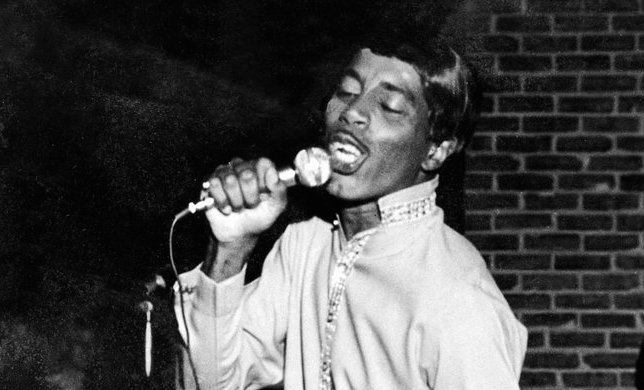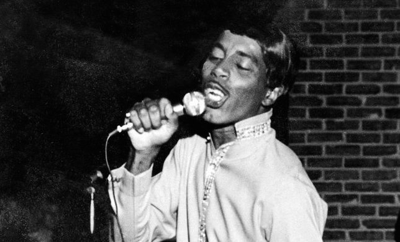
Clifford Curry performing
Soul singer extraordinaire and longtime Nashville resident Clifford Curry died in Knoxville on Wednesday, Sept. 7, after suffering a stroke on Aug. 29. He was 79.
Although in his long career Curry achieved only one national hit — 1967’s "She Shot a Hole in My Soul" — his impact on Nashville’s soul music scene and the lives he touched through his performances and personal acts of kindness will long be remembered.
Guitarist and songwriter Mac Gayden recalls the first time he met Curry and the instant effect the singer had on a room full of experienced “seen-it-all” session players.
“When I first met Clifford, I had several songs I had written for him to sing, but I didn’t know what to expect,” Gayden tells the Scene. “He walked in, and everybody just gravitated to him. He had such a loving spirit. He was kind of like the sun coming out from behind the clouds. As soon as we heard the playback on ‘She Shot a Hole in My Soul,’ everybody knew it was going to be a hit.”
Born in Knoxville on Nov. 3, 1936, Curry entered his teenage years as the cultural landscape of America was being transformed by popular music. In the late 1940s, radio stations across the South began programming music aimed directly at African-American audiences, and the sound of postwar R&B gripped the attention of teenagers on both sides of the color line.
Beginning in his high school years, Curry performed with a number of vocal groups, both sacred and secular, including The Echoes, The Five Pennies, The Hollyhocks, The Bubba Suggs Band, and Knoxville’s first integrated vocal group, The Fabulous Six. With these groups and as a solo artist he recorded singles for Savoy, Excello and a number of other independent labels. He joined Knoxville’s the Midnights in 1963, fronting the otherwise white R&B band as they rose to stardom on the Southern white fraternity circuit, but Curry had his sights set on bigger successes.
In 1966, Curry’s Midnights bandmate and WNOX DJ Rob Galbraith sent a demo tape of Curry to Nashville singer-songwriter, publisher and producer Buzz Cason, who was immediately impressed.
“Bobby Russell and I had just formed Elf Records and we didn’t have any artists yet,” Cason recalls. “I liked [Clifford’s] voice, his dedication and his focus on what he was doing. He wasn’t the greatest singer in the world, but he was definitely a stylist. When you heard Clifford you knew it was him. He had a great feel and a soulful delivery, and when I saw him perform live, I knew he had great potential. No one could follow Clifford, he always closed the show.”
At the same time, Gayden had written “She Shot a Hole in My Soul.” His friend Chuck Neese supplied the song’s title and central hook after hearing a DJ on local soul station WVOL saying, “If you don't dig that, you got a hole in your soul!” Curry cut the song in Wayne Moss’ Cinderella Sound studio, housed in a converted garage in Madison, with a band that included many of the new younger generation of “Nashville Cats” — Gayden on lead guitar, Kenny Buttrey on drums, Norbert Putnam on bass, Larry Butler on piano and Bergen White and Bob Phillips on horns, with Cason and Carol Montgomery supplying background vocals.
The result was a perfect example of the developing Nashville soul sound — a powerful blend of Southern soul funk and Motown polish, with just a touch of hillbilly spice. Released in April 1967, the song made a large and immediate splash regionally, rising to the top of the charts in Tennessee, Kentucky, Georgia and the Carolinas. The record also caught national attention, reaching No. 45 on the Billboard R&B Chart in May 1967 and crossing over to No. 95 on the Billboard Hot 100.
Curry and Cason tried to replicate the success of that first hit with seven more top-notch releases on Elf, but the singer’s moment had passed. While the magical formula for producing a hit eluded his grasp, Curry’s musical career proved far from over. Throughout the 1970s he continued recording first-class records for a variety of independent labels while remaining a popular performer on the Southern soul circuit.
“She Shot a Hole in My Soul” would eventually prove to have much longer legs than indicated by those 1967 Billboard rankings. Long after it faded from the charts, it continued to be a favorite standard in the beach music scene in the Carolinas, and Curry found steady gigs in the nightclubs of Myrtle Beach, S.C., and the surrounding area. He was inducted into the Beach Music Hall of Fame in 1995 and remained a popular live attraction into the 21st century, eventually earning the title “The King of Beach Music,” and winning the 2015 Carolina Beach Music Award for his solo album Cold Beer and Hot Women. Across the Atlantic, Curry’s mid-’60s singles for Elf gained a following in the U.K.’s Northern Soul scene, resulting in several tours across the pond.
When the Country Music Hall of Fame and Museum opened the exhibit Night Train to Nashville: Music City Rhythm & Blues 1945-1970 in 2004, one of the most iconic images on display was a 1968 photo of Clifford Curry performing at the Centennial Park bandshell, backed by Wade Conklin, Cason and Gayden. It’s a moment captured in time of black and white Tennessee players uniting through the power of music from an era when racial tensions were threatening to tear the United States apart.
“Clifford always knew exactly which buttons to push with an audience at just the right time,” Gayden says. “On stage or off, he was always the same. He always had his heart wide open to everyone.”
%{[ data-embed-type="oembed" data-embed-id="https://www.youtube.com/watch?v=0k8fepmmBOY" data-embed-element="aside">







